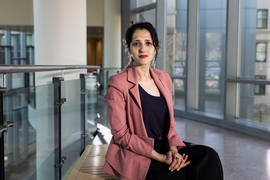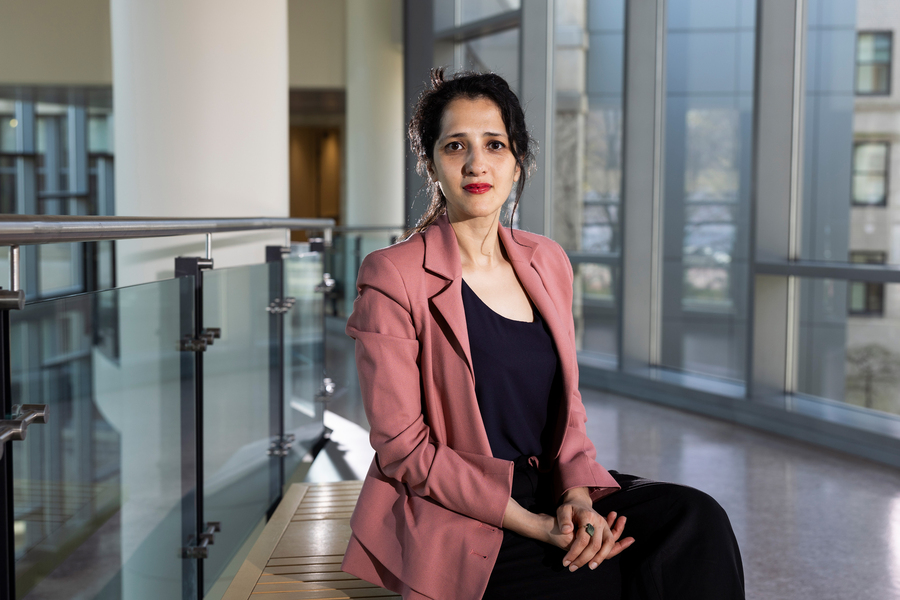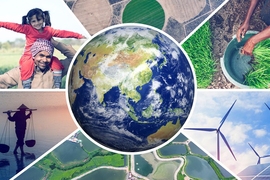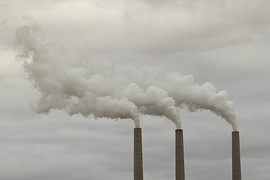In less than a decade, MIT economist Namrata Kala has produced a corpus of work too rich, inventive, and diverse to be easily summarized. Let’s try anyway.
Kala, an associate professor at the MIT Sloan School of Management, often studies environmental problems and their effects on workers and firms, with implications for government policy, corporate managers, and anyone concerned about climate change. She also examines the effects of innovation on productivity, from farms to factories, and scrutinizes firm organization in light of such major changes.
Kala has published papers on topics including the long-term effects of climate change on agriculture in Africa and India; the impact of mechanization on farmers’ incomes; the extent to which linguistic differences create barriers to trade; and even the impact of LED light bulbs on factory productivity. Characteristically, Kala looks at issues of global scale and pinpoints their effects at the level of individuals.
Consider one paper Kala and two colleagues published a couple of years ago, about the effects of air pollution on garment factory workers in India. The scholars examined patterns of particulate-matter pollution and linked that to detailed, worker-level data about how productive workers were along the production line. The study shows that air pollution damages sewing productivity, and that some managers (not all) are adept at recognizing which workers are most affected by it.
What emerges from much of this work is a real-time picture of human adaptation in a time of environmental distress.
“I feel like I’m part of a long tradition of trying to understand resilience and adaptation, but now in the face of a changing world,” Kala says. “Understanding interventions that are good for resilience while the world is changing is what motivates me, along with the fact that the vast majority of the world is vulnerable to events that may impact economic growth.”
For her research and teaching, Kala was awarded tenure at MIT last year.
Joining academia, then staying in it
Kala, who grew up in Punjab, India, was long mindful of big issues pertaining to society, the economy, and the environment.
“Growing up in India, it’s very difficult not to be interested in the some of the questions that are important for development and environmental economics,” Kala says.
However, Kala did not expect that interest to lead her into academia. She attended Delhi University as an undergraduate, earning her degree with honors in economics while expecting to find a job in the area of development. To help facilitate that, Kala enrolled in a one-year master’s program at Yale University, in international and development economics.
Before that year was out, Kala had a new realization: Studying development problems was integral to solving them. Academia is not on the sidelines when it comes to development, but helps generate crucial knowledge to foster better and smarter growth policies.
“I came to Yale for a one-year master’s because I didn’t know if I wanted to be in a university for another two years,” Kala says. “I wanted to work on problems in the world. And that’s when I became enthralled with research. It was this wonderful year where I could study anything, and it completely changed my perspective on what I could do next. So I did the PhD, and that’s how I became an economist.”
After receiving her PhD in 2015, Kala spent the next two years supported by a Prize Fellowship in Economics, History, and Politics at Harvard University and a postdoctoral fellowship at MIT’s own Abdul Latif Jameel Poverty Action Lab (J-PAL). In 2017, she joined the MIT faculty on a full-time basis, and has remained at the Institute since then.
The source material for Kala’s studies varies widely, though in all cases she is looking for ways to construct well-defined empirical studies tackling major questions, with key issues often revealed in policy or firm details.
“I find reading stuff about policy reform strangely interesting,” she quips.
Development, but with environmental quality
Indeed, sometimes the spark for Kala’s studies comes from her own broad knowledge of past policy reforms, combined with an ability to locate data that reveals their effects.
For instance, one working paper Kala and a colleague recently completed looks at an Indian policy to move industrial firms out of Delhi in order to help solve the city’s pollution problems; the policy randomly relocated companies in an industrial belt around the city. But what effect did this have on the firms? After examining the records of 20,000 companies, the researchers found these firms’ survival rate was 8 percent to 20 percent lower than if the policy called for them to be clustered more efficiently.
That finding suggests how related environmental policies can be designed in the future.
“This environmental policy was important in that it improved air quality in Delhi, but there’s a way to do that which also reduces the cost on firms,” Kala says.
Kala says she expects India to be the locus of many, though hardly all, of her future studies. The country provides a wide range of opportunities for research.
“India currently has both the largest number of poor people in the world as well as 21 of the 30 most polluted cities in the world,” Kala says. “Clearly, the tradeoff between development and environmental quality is extremely salient, and we need progress in understanding industrial policies that are at least environmentally neutral or improving environmental quality.”
Kala will continue to look for new ways to take pressing, large-scale issues and study their effects in daily life. But the fact that her work ranges so widely is not just due to the places she studies; it is also because of the place she studies them from. MIT, she believes, has provided her with an environment of its own, which in this case enhances her own productivity.
“One thing that helps a lot is having colleagues and co-authors to bounce ideas of off,” Kala says. “Sloan is the heart of so much interdisciplinary work. That is one big reason why I’ve had a broad set of interests and continue to work on many things.”
“At Sloan,” she adds, “there are people doing fascinating things that I’m happy to listen to, as well as people in different disciplines working on related things who have a perspective I find extremely enriching. There are excellent economists, but I also go into seminars about work or productivity or the environment and come away with a perspective I don’t think I could have come up with myself.”









